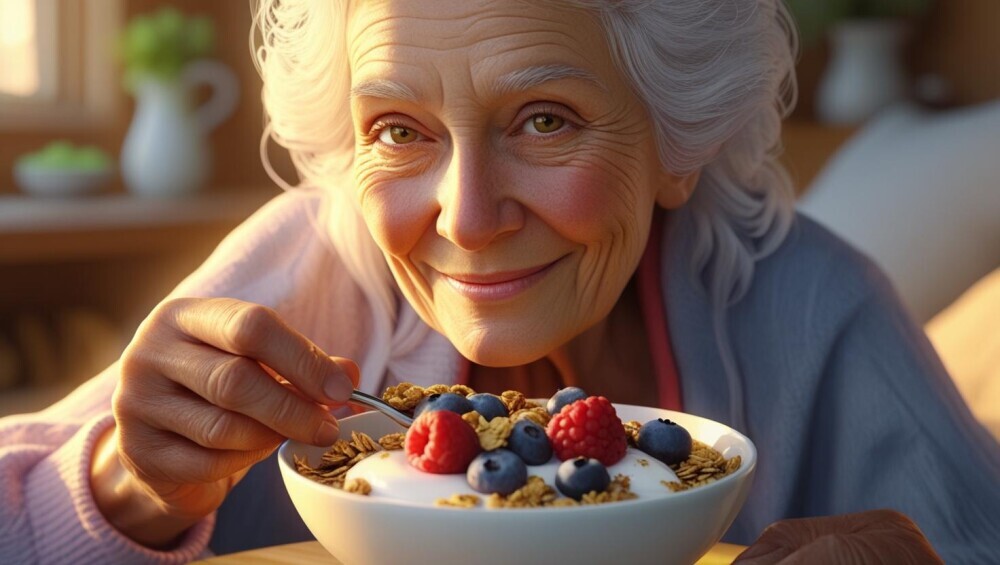Nutrition plays a huge role in the overall health and life quality as we age and enter our senior years. You might be wondering why it’s such a big deal. Well, as we grow older, our bodies undergo changes that can make it trickier to absorb and utilize nutrients.
A well-balanced diet can significantly enhance quality of life, support cognitive and physical function, and reduce the risk of chronic disease in older adults.
Statistics paint a clear picture: a significant number of older adults face nutritional challenges, leading to a range of health issues from weakened immune systems to higher susceptibility to chronic diseases. These aren’t just numbers on a page. Each one represents a life potentially affected by the foods they do or do not consume.
This leads to some interesting questions. How does what we eat affect us in our senior years? What exactly changes in our nutritional needs as we age, and how can we ensure that nutritional gaps are closed? These questions set the stage for understanding what seniors should focus on when planning their diet and how loved ones can assist in this journey.
How Nutrition Shapes the Health of the Elderly
Nutrition can significantly shape the journey of aging, influencing everything from energy levels to chronic disease management. As the body ages, its ability to absorb essential nutrients decreases, making nutrition a cornerstone of health. Metabolism slows, and muscle mass naturally declines, increasing the risk of frailty and chronic illness.
A nutrient rich diet helps with the following:
- Boosts immunity and reduces infection risk
- Supports bone health and prevents fractures
- Enhances cognitive functions and mood
- Improves energy levels and mobility
- Manage chronic conditions like diabetes, heart disease, and hypertension
Poor nutrition, on the other hand, can exacerbate age related issues and lead to malnutrition, even in overweight individuals.
Seniors often face common nutritional deficiencies. Vitamin D, calcium, and B12 top the list, with deficiencies leading to issues like osteoporosis and cognitive decline. It is like trying to run on low fuel and things just don’t work as they should.
A diet rich in fruits, vegetables, lean proteins, and whole grains can help maintain a robust health profile. These foods offer not just the nutrients needed but also support immune functions and slow down age related health issues.
Meal composition and timing are critical. For instance, smaller, more frequent meals might work better than three big ones. It’s about feeding the body what it needs, when it needs it.
Implementing a balanced diet can ward off what doctors call ‘malnutrition.’ This isn’t just about weight loss or gain. It is about lack of essential nutrients, which can have a big impact on how our bodies operate.
Key Factors Influencing Nutritional Needs in Elderly Adults
There are several key factors that play into how seniors experience and manage their nutritional needs. Age alone brings on changes like decreased metabolic rate and altered digestive processes, which affect how food and nutrients are processed and utilized.
Physical health issues and genetics are also significant contributors. For instance, someone with a family history of osteoporosis might require more calcium rich foods to keep their bones strong. Additionally, conditions like diabetes or heart disease necessitate specific dietary adjustments to manage symptoms effectively.
Medications and existing medical conditions can interfere with nutrient absorption. Some medicines might dampen the appetite or make certain nutrients harder to digest, throwing a challenge into maintaining a balanced diet. It is always advisable and crucial to consult with healthcare providers to understand these interactions fully.
Lifestyle choices play a pivotal role. Maintaining an active lifestyle, even with light activities, can help balance caloric needs. Those still buzzing with energy might require more calories compared to those with a more sedentary lifestyle.
Dietary habits shouldn’t be static. As activity levels, health measures, and even personal preferences shift, so should our approach to eating. It’s not just about getting enough calories but ensuring those calories are nutritive and supportive of current health needs.
The Indispensable Role of Vitamins in Senior Health
Essential vitamins are like backstage crew members, ensuring everything runs smoothly without much fanfare. Vitamin requirements tend to shift with age, making it critical to understand what’s needed to keep the body performing at its best.
Take Vitamin D, for example, crucial for maintaining bone health and supporting the immune system. As people age, the skin’s ability to synthesize Vitamin D from sunlight decreases, often requiring more dietary intake or supplementation to fill the gap.
Calcium and Vitamin B12 also step into the spotlight as heroes in senior diets. While calcium keeps the bones sturdy and strong, B12 is vital for nerve function and red blood cell production. Deficiencies in these vitamins can lead to complications like osteoporosis or anemia, respectively.
Not getting enough vitamins can result in serious health issues over time. Seniors might face a higher risk of chronic diseases or slow recovery from illnesses. That’s why proper vitamin intake is crucial.
A diet diversified with vegetables, fruits, lean meats, and nuts can help meet vitamin needs naturally. However, consulting a healthcare provider about potential supplements tailored to individual health profiles might be necessary to ensure all bases are covered.

Keeping an eye on vitamin levels shouldn’t feel like a chore. Simple adjustments, like incorporating fortified cereals or a glass of fortified orange juice, can make a significant difference in getting the necessary nutrients each day.
Adapting Nutritional Requirements with Age: Key Changes Explained
As we age, our bodies don’t stay the same, and neither do our nutritional needs. One major change is how our metabolism slows down. This means the body uses energy less efficiently, and what might have worked in our 30s or 40s needs tweaking in later years.
The body’s ability to absorb nutrients can also take a hit. Digestive systems might not soak up vitamins and minerals as effectively as before, so even if eating the same diet, the actual nutrients making it into the bloodstream might drop.
Caloric needs often decrease with age because of lower activity levels and a slower metabolic rate. However, the demand for nutrient dense foods goes up and each bite needs to pack more nutritional punch to support overall health.
Changes in taste and appetite also come into play. This can be due to factors like hormonal changes, medications, or even dental health. Adjustments in meal planning might include softer foods or more flavorful options to entice eating.
The importance of fluids can’t be overstated either. Seniors are at a higher risk of dehydration because of a reduced sense of thirst. Incorporating soups, broths, and even smoothies can be an effective way to ensure adequate fluid intake alongside nutrients.
Adjusting to these changes isn’t about cutting out the enjoyment of food. It’s about being mindful of what’s on the plate and making choices that cater to the body’s evolving needs, keeping health and vitality at the forefront.
Practical Tips and Strategies to Optimize Senior Dietary Habits
Healthy eating doesn’t have to be a daunting task for seniors. With a few practical tips, making smart nutritional choices can become second nature. One of the simplest approaches is to create a balanced plate. Think of filling half the plate with colorful fruits and veg, a quarter with lean proteins, and the remaining with whole grains.

Meal prep can be a lifesaver, especially when energy levels fluctuate. Batch cooking favorite meals and freezing portions for easier microwave dinners can help ensure healthy eating even on low energy days. Getting into a rhythm with meal prep means always having nutritious options on hand.
Bringing in the family for support can also make a big difference. Whether it’s having a loved one help with grocery shopping or sharing a cooking day to prepare meals together, involving others can offer encouragement and make nutritious eating feel less like a solo endeavor.
Don’t underestimate the role of healthcare providers. Regular checks for dietary advice and nutritional assessments can catch deficiencies early on and allow for adjustments. They can make personalized recommendations for supplements or tailored diet plans based on individual health needs.
Staying hydrated seems basic, but it’s vital. Keeping a water bottle handy or flavoring water with a bit of lemon can make drinking more appealing. Sometimes we confuse thirst with hunger, so sipping water regularly can help regulate appetite.

With these strategies, senior dietary habits can evolve into a more health focused lifestyle without losing out on the joy of eating. Each change, no matter how small, contributes to enhanced well being and a fuller, more vibrant life.
Conclusion
Dietary habits in senior years are more than just about eating less or choosing lighter meals—they must be strategic to meet evolving nutritional needs. By understanding how aging affects vitamin requirements, seniors and caregivers can make informed choices to support long-term health and well-being.
A diet rich in fruits, vegetables, whole grains, lean proteins, and fortified foods, combined with smart supplementation when necessary, can help seniors stay energized, resilient, and independent throughout their golden years.
FAQ
What vitamins are most important for seniors, and why do they need more of them?
Vitamin D, calcium, and B12 are especially important for seniors. Aging reduces the body’s ability to absorb or synthesize these nutrients effectively. For instance, less vitamin D is produced from sunlight, calcium helps prevent osteoporosis, and B12 supports nerve function and red blood cell production.
How do dietary habits need to change as we age?
As we age, our metabolism slows and nutrient absorption decreases. This means seniors need fewer calories but more nutrient-dense foods. Adjusting meal timing, eating smaller frequent meals, and focusing on hydration also become more important.
Can lifestyle and medications affect vitamin needs in seniors?
Yes. Medical conditions and medications can interfere with nutrient absorption or appetite. For example, certain prescriptions may deplete vitamin levels or reduce hunger, making it critical to adapt dietary plans and consult healthcare providers regularly.


This was a really interesting read. I didn’t realize how much aging affects how our bodies absorb vitamins and nutrients. It makes sense why older adults have to pay extra attention to things like Vitamin D and B12.
I’ve seen this with my own grandparents. My grandma started having low energy and was forgetting things more often, and it turned out she had a B12 deficiency. Once her doctor got her on supplements and helped her adjust her diet, she felt so much better.
I think it’s so important that you mentioned how metabolism slows down and taste changes too. Sometimes my grandpa says nothing tastes good anymore, which makes it even harder to get the nutrients he needs.
Overall, I agree that nutrition plays a huge role in keeping seniors feeling their best. It’s good to know that simple things like adding fortified foods or planning smaller meals can really help.
I’m curious—
Do you think most seniors need to take daily vitamin supplements, or can they get enough just through food?
Are there certain foods that help improve energy levels for seniors?
Thank you so much for your thoughtful comment and for sharing your personal experience about your grandparents. It really highlights how powerful proper nutrition and targeted supplementation can be in improving quality of life.
You have raised some great questions. Whether most seniors need daily vitamin supplements really depends on individual health status, dietary habits, and any existing medical conditions. Ideally, nutrients should come from a well balanced, whole food diet rich in vegetables, fruits, whole grains, lean proteins, and healthy fats. However, due to age related changes, such as decreased absorption of certain nutrients, medication interactions, and reduced appetite, many older adults may find it challenging to meet all their needs through food alone. This is why healthcare providers often recommend supplements, particularly for vitamins like B12, D, and sometimes calcium, based on lab results and dietary patterns.
As for boosting energy levels, nutrient dense foods that support metabolism and prevent fatigue can make a big difference. Some great options include:
Whole grains (like oats, quinoa, and brown rice) for steady energy releaseLean proteins (such as eggs, poultry, fish, or legumes) to support muscle maintenance and staminaIron-rich foods (like spinach, lentils, and fortified cereals) to help prevent anemia related fatigueHealthy fats (like avocado, nuts, and olive oil) for sustained energyAnd of course, hydration plays a huge role in maintaining energy and focus, so fluids shouldn’t be overlooked.
When taste changes or low appetite become obstacles, small strategies like flavor enhancements, trying different textures, or incorporating fortified or blended foods like smoothies, can really help improve intake and enjoyment.
Thanks again for engaging with the article. Conversations like these are so important in helping families make informed, compassionate choices for their loved ones.